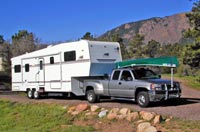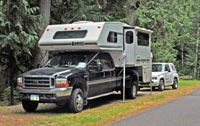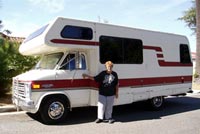| Buying a New RV — or Not! by Jaimie Hall |
|
When George and I met, we each had an RV. His
was a 2001 30-foot New Horizon fifth wheel, pulled by a GMC
Duramax. After eight years of full-time RVing in a 32-foot
Pace Arrow, I now had a home base and a Lance camper with
slideout on a 350 Ford with 4-wheel drive.
We spent last winter in the fifth wheel at Big
Bend National Park where George volunteered. While it
was very comfortable, we decided to take the smaller Lance
to Alaska that summer. The New Horizon and truck have an overall
length of almost 50 feet. We thought we could go more places
more easily in the camper, even though George had driven the
larger rig to Alaska in 2003.
We began talking about eventually selling both RVs and buying something in between the two in size. A motorhome under 30 feet, possibly with a slideout, would be compact yet provide more living area and more comfort than the camper, and it would also be easier to park than the fifth wheel.
In March, after presenting my Support Your RV Lifestyle seminar at the FMCA convention in Pomona, California, we looked at the motorhomes on display, concentrating on those 30 feet or less in length. Both of us wanted a regular bed. Most shorter units either had a pullout bed or a bed in the corner, often with the bottom corner angled. Finally we stepped into the Safari Trek. It is unique in that the bed can be raised to the ceiling above the living area during the day and lowered for use. Treks are 27, 28 or 29 feet long. However, the inside is like a much larger unit but without the bedroom. Another plus: George is tall and could easily walk under the bed when stowed.
RESEARCH
To find out more about the Trek, George joined the RV Consumer Group as a basic member. Besides obtaining ratings on various brands of RVs, he also received the book How to Select, Inspect, and Buy an RV. When you consider you will often spend more than $100,000 on a new RV, the $98 or $139 membership fee is well worth it. The Trek was highly rated in several categories as a "snowbird unit."
George also joined a Trek user group. User groups are made up of owners and potential owners of a particular brand who share information. User groups can often be found online; search for "RV user groups". User groups often list older models for sale as well as give advice. Fellow RV columnist Alice Zyetz found her used Lazy Daze motorhome through one.
George posed a number of questions that could only be answered by actual experience, questions like, "Do you have problems with the bed going up and down?" and "Can you put an air mattress on the bed?" He also inquired about solar panels. He found that Trek does not have a solar readiness package, so a buyer would have to pay for after-market modifications.
FACTORY TOUR
Touring the Northwest, we set up an appointment
with the Trek manufacturing facility in Coburg, Oregon. (Since
our visit, the Trek manufacturing plant has been moved to
Wakarusa, Indiana.) The tour was very informative, and we
could observe the quality of workmanship.
A dealership was located nearby so we looked at completed
units. We saw three. We stopped by again several weeks later
hoping to see one with a blue interior but were out of luck.
One of the drawbacks to the Trek is that the bed lowers over the main sitting area and optional computer desk. If one person was in bed, the person who was up would not have a comfortable place to sit or work. We considered making the eating table in the kitchen area into a desk. Then we read in the brochure that any changes would incur a large engineering fee and not include the cost of materials. Nor would you get a credit for an item you did not use.
For almost six months we traveled in the Lance camper, towing a Suzuki Sidekick. While the camper is convenient for short trips, it had many limitations for extended travel. The main drawback was lack of a comfortable place to sit. I do know of RVers who travel full-time in a Lance camper, but we realized it does not work for us.
DECISION
After returning home, we talked about what to
do. We will definitely sell the Lance. However, if we purchased
a Trek, we would need to make modifications to suit us. The
most economical choice would be to find an older rig and do
the modifications ourselves. The New Horizon is already customized,
comfortable, in excellent condition and has four solar panels
and an inverter. We did not end up going to Alaska, but we
could have taken it any place we took the camper last summer.
So we decided, all things considered, to keep the fifth wheel.
Besides, it's paid for!
Jaimie Hall
1/7/07
(Updated June 20, 2021, RTA)




